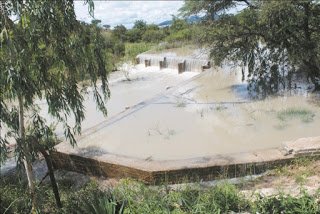
The contentious dam wall built by Marapira
…Mutirikwi sub-catchment council probes project
Upenyu Chaota
The Masvingo community is up in arms against Agriculture, Mechanisation and Irrigation Development deputy minister, Davis Marapira who has built his own wall across a section of Mucheke River and is using the impounded water to irrigate crops at his own farm.
Stakeholders who spoke to TellZim News said the improvised dam wall must be demolished so as to free up the water for the greater good of the community.
Family and Friends of Rivers and Lakes in Zimbabwe (Faforaliz) national chairperson, Pianos Chadya said the wall built by Marapira was illegal and must therefore be demolished.
“As an organisation, we wonder what the responsible authorities are doing when they let such acts go unpunished. We deal with the protection, correction and conservation of the environment with special concern to water as a critical resource.
“Our hearts bleeds when we see Mucheke River chocked like that because of one person who is inconsiderate. There is a lot of impurities getting into the river and we want that water to be let free so that it can come and wash some of those things away.
“We are noticing a rapid growth of the problematic water hyacinth because water has not been flowing as it ought to do. We have marine life which is affected if the water is not flowing. If Marapira genuinely wants to irrigate his farm, he should make another plan rather than block the river,” said Chadya.
He said he was informed that the Environmental Management Agency (Ema) had disapproved the project but Marapira went on to use his political muscle to have his way.
Runde Catchment Council manager Stanley Nazombe, in emailed response to TellZim News questions, said the community had the right to launch complaints to their sub-catchment council which would then be obliged to investigate.
“The Water Act provides for the community to lodge complaints to their respective sub-catchment council. Where genuine concerns are brought forward, the council is obliged to investigate and advice the proponent on remedial actions required if any.
“Where a particular community requires to be engaged for their fears to be allayed regarding the construction of water storage facilities, Runde Catchment Council stand ready to assist,” said Nazombe.
The wall is built by farm bricks that Nazombe hinted could be unfit for the job as they are too susceptible to wear and tear.
“From a technical view, the material mentioned may not be the best, and efforts to ameliorate the situation may need to be employed,” Nazombe said.
Reports also say Marapira is not paying for the water he is exploiting from Mucheke River to the Mutirikwi Sub-catchment Council as required by Statutory Instrument (SI) 47/2000.
The SI demands that those who would have been given the go ahead to build their own dams in terms of the Water Act Chapter 20:24 be levied by the area’s sub-catchment council.
When contacted for comment, Mutirikwi Sub-catchment Council manager, Taruvinga Chivasa said they had probed the legality of Marapira’s project and had forwarded their findings to the Runde Catchment Council to deliberate.
“There are water procedures that are followed as provided for by the Water Act. We received the concerns about Marapira’s irrigation project and we did our investigation. Two councils will seat to deliberate on the issue and we as the Mutirikwi sub-catchment council have already convened and we have forwarded our resolutions to the Runde Catchment Council that will have the final say.
“I cannot tell you offhand that the Marapira irrigation project is legal or illegal until the Runde Catchment Council convenes,” said Chivasa.
Last week, TellZim News quoted City of Masvingo mayor Hubert Fidze expressing bewilderment that the deputy minister had deemed it fit to deprive the whole community of water that should be flawlessly flowing into Lake Mutirikwi.
In his response to questions from TellZim News last week, Marapira defended his actions saying it was in line with government’s water harvesting policies.
The understanding, however, is that water harvesting is about rainwater and runoff, and is not about blocking the flow of rivers to exploit their waters.local
